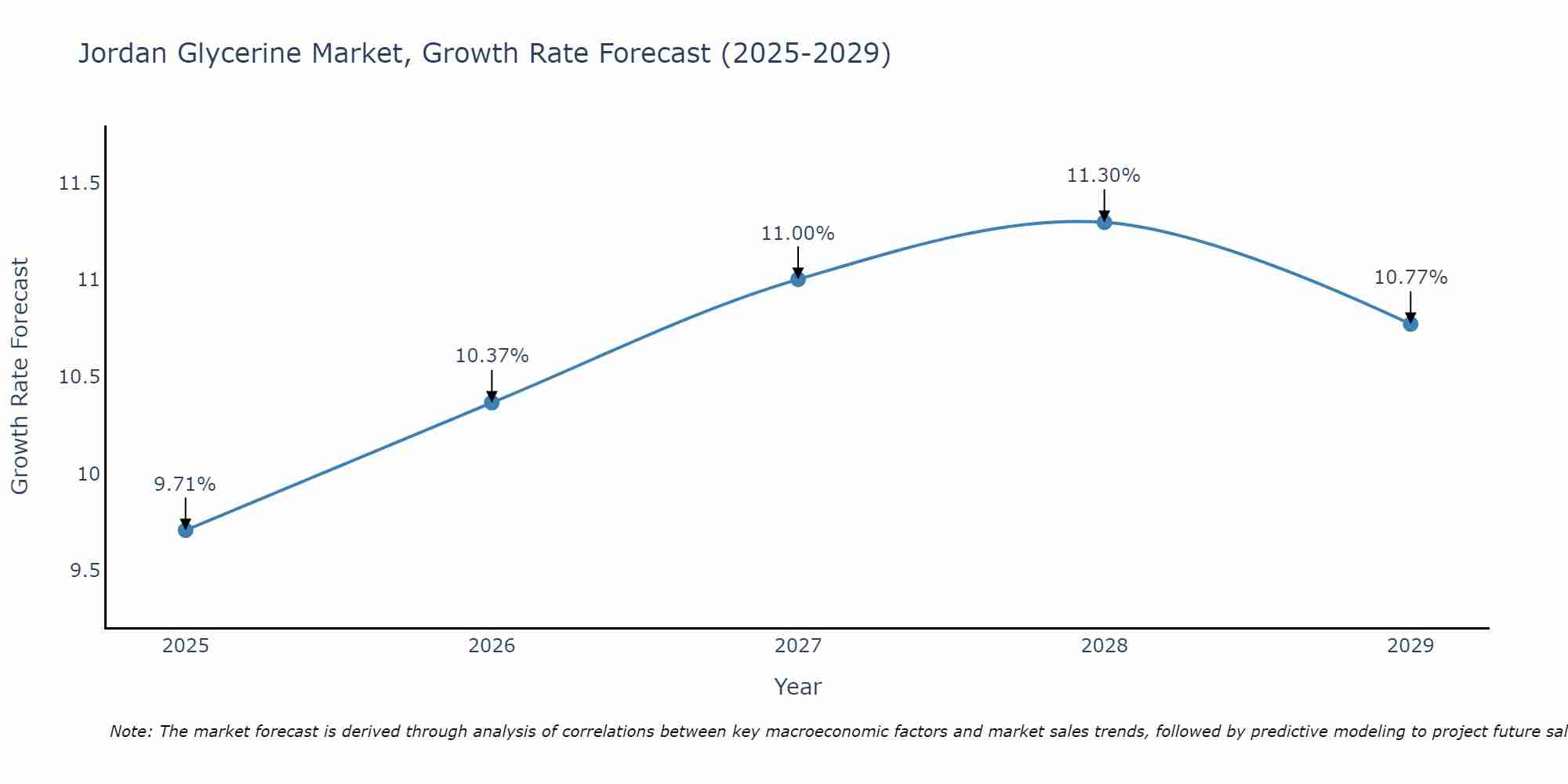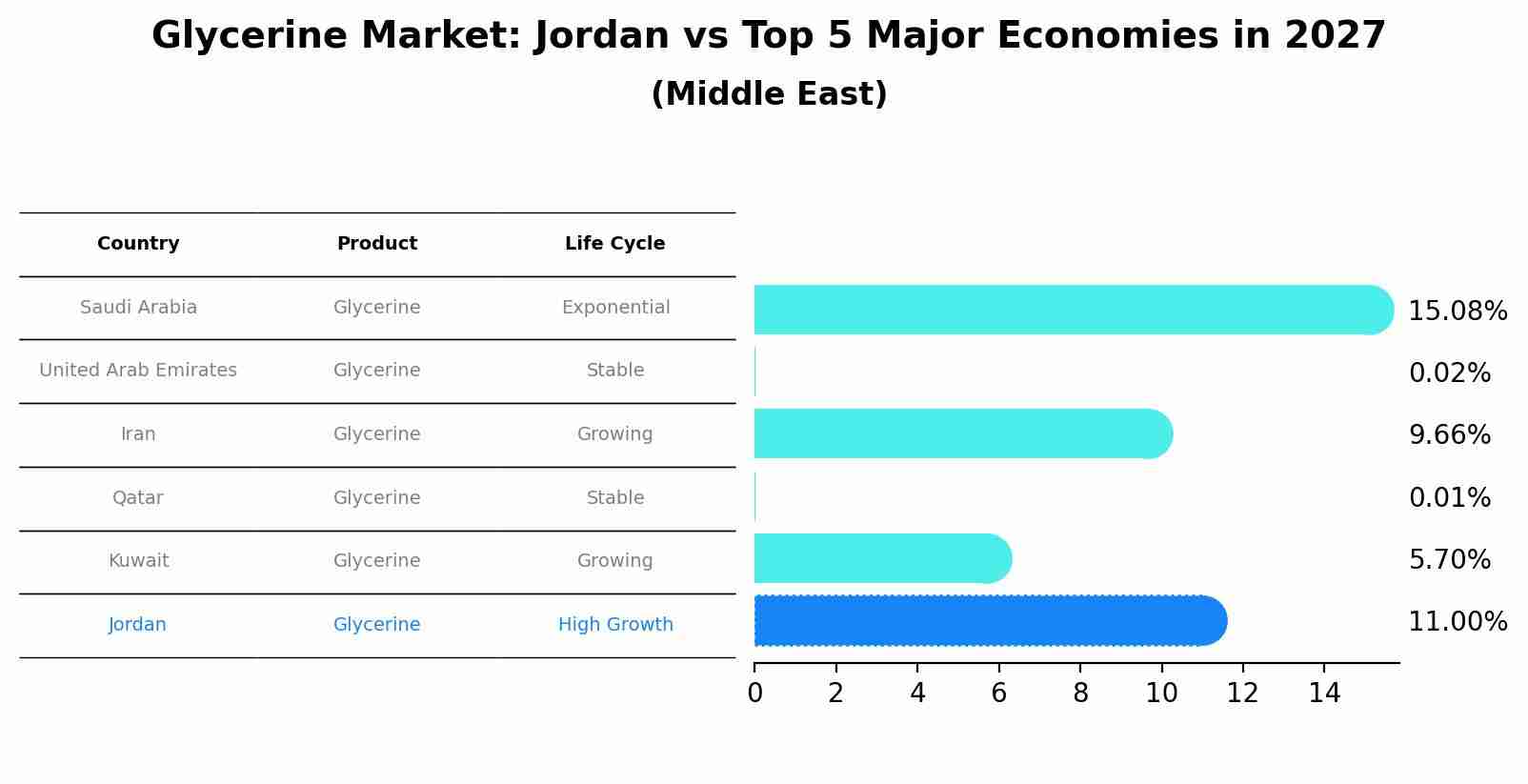Jordan Glycerine Market Outlook | Value, COVID-19 IMPACT, Trends, Share, Companies, Size, Analysis, Forecast, Revenue, Growth & Industry
| Product Code: ETC326746 | Publication Date: Aug 2022 | Updated Date: Apr 2025 | Product Type: Market Research Report | |
| Publisher: 6Wresearch | Author: Shubham Padhi | No. of Pages: 75 | No. of Figures: 35 | No. of Tables: 20 |
Jordan Glycerine Market Size Growth Rate
The Jordan Glycerine Market is projected to witness mixed growth rate patterns during 2025 to 2029. Growth accelerates to 11.30% in 2028, following an initial rate of 9.71%, before easing to 10.77% at the end of the period.

Glycerine Market: Jordan vs Top 5 Major Economies in 2027 (Middle East)
Jordan's Glycerine market is anticipated to experience a high growth rate of 11.00% by 2027, reflecting trends observed in the largest economy Saudi Arabia, followed by United Arab Emirates, Iran, Qatar and Kuwait.

Jordan Glycerine Market Overview
The glycerine market in Jordan, synonymous with glycerin, sees extensive usage in similar industries: personal care, pharmaceuticals, food and beverages, and industrial applications. The market benefits from glycerines versatile properties, such as its ability to act as a humectant, solvent, and sweetener. The growing emphasis on natural and organic products in personal care and food sectors further boosts the demand for glycerine. The market dynamics are shaped by both local production capabilities and imports to meet the diverse requirements of end-users.
Drivers of the market
The demand for glycerine in Jordan is primarily driven by its extensive use in cosmetic, pharmaceutical, and food products. Glycerine`s versatile properties, such as its ability to retain moisture and act as a solvent, make it a valuable ingredient. The rising consumer awareness of the benefits of glycerine in skincare and the increasing production of pharmaceuticals and food products support market expansion.
Challenges of the market
Similar to the glycerin market, the glycerine market in Jordan faces high production costs and the challenge of competing with alternative products. The market is constrained by a limited supply of raw materials and high dependency on imports. Quality control and regulatory compliance are critical issues that require significant investment and expertise. Furthermore, the market is sensitive to global price fluctuations and economic conditions, which can affect the availability and affordability of glycerine products.
Government Policy of the market
Similar to its support for the glycerin market, the Jordan government has implemented policies to boost the glycerine industry. These policies focus on enhancing production capabilities, supporting research and development, and promoting the use of glycerine in pharmaceuticals, cosmetics, and other industries. Incentives for sustainable production practices are also a key component of these policies, aimed at ensuring environmental and economic sustainability.
Key Highlights of the Report:
- Jordan Glycerine Market Outlook
- Market Size of Jordan Glycerine Market, 2024
- Forecast of Jordan Glycerine Market, 2031
- Historical Data and Forecast of Jordan Glycerine Revenues & Volume for the Period 2018 - 2031
- Jordan Glycerine Market Trend Evolution
- Jordan Glycerine Market Drivers and Challenges
- Jordan Glycerine Price Trends
- Jordan Glycerine Porter's Five Forces
- Jordan Glycerine Industry Life Cycle
- Historical Data and Forecast of Jordan Glycerine Market Revenues & Volume By Grade for the Period 2018 - 2031
- Historical Data and Forecast of Jordan Glycerine Market Revenues & Volume By USP Grade for the Period 2018 - 2031
- Historical Data and Forecast of Jordan Glycerine Market Revenues & Volume By Technical Grade for the Period 2018 - 2031
- Historical Data and Forecast of Jordan Glycerine Market Revenues & Volume By Application for the Period 2018 - 2031
- Historical Data and Forecast of Jordan Glycerine Market Revenues & Volume By Personal Care for the Period 2018 - 2031
- Historical Data and Forecast of Jordan Glycerine Market Revenues & Volume By Food & Beverages for the Period 2018 - 2031
- Historical Data and Forecast of Jordan Glycerine Market Revenues & Volume By Pharmaceuticals for the Period 2018 - 2031
- Historical Data and Forecast of Jordan Glycerine Market Revenues & Volume By Polyether Polyols for the Period 2018 - 2031
- Historical Data and Forecast of Jordan Glycerine Market Revenues & Volume By Chemical Intermediate for the Period 2018 - 2031
- Historical Data and Forecast of Jordan Glycerine Market Revenues & Volume By Tobacco for the Period 2018 - 2031
- Historical Data and Forecast of Jordan Glycerine Market Revenues & Volume By Others for the Period 2018 - 2031
- Jordan Glycerine Import Export Trade Statistics
- Market Opportunity Assessment By Grade
- Market Opportunity Assessment By Application
- Jordan Glycerine Top Companies Market Share
- Jordan Glycerine Competitive Benchmarking By Technical and Operational Parameters
- Jordan Glycerine Company Profiles
- Jordan Glycerine Key Strategic Recommendations
Frequently Asked Questions About the Market Study (FAQs):
- Single User License$ 1,995
- Department License$ 2,400
- Site License$ 3,120
- Global License$ 3,795
Search
Thought Leadership and Analyst Meet
Our Clients
Related Reports
- Germany Breakfast Food Market (2026-2032) | Industry, Share, Growth, Size, Companies, Value, Analysis, Revenue, Trends, Forecast & Outlook
- Australia Briquette Market (2025-2031) | Growth, Size, Revenue, Forecast, Analysis, Trends, Value, Share, Industry & Companies
- Vietnam System Integrator Market (2025-2031) | Size, Companies, Analysis, Industry, Value, Forecast, Growth, Trends, Revenue & Share
- ASEAN and Thailand Brain Health Supplements Market (2025-2031) | Strategy, Consumer Insights, Analysis, Investment Trends, Opportunities, Growth, Size, Share, Industry, Revenue, Segments, Value, Segmentation, Supply, Forecast, Restraints, Outlook, Competition, Drivers, Trends, Demand, Pricing Analysis, Competitive, Strategic Insights, Companies, Challenges
- ASEAN Bearings Market (2025-2031) | Strategy, Consumer Insights, Analysis, Investment Trends, Opportunities, Growth, Size, Share, Industry, Revenue, Segments, Value, Segmentation, Supply, Forecast, Restraints, Outlook, Competition, Drivers, Trends, Demand, Pricing Analysis, Competitive, Strategic Insights, Companies, Challenges
- Europe Flooring Market (2025-2031) | Outlook, Share, Industry, Trends, Forecast, Companies, Revenue, Size, Analysis, Growth & Value
- Saudi Arabia Manlift Market (2025-2031) | Outlook, Size, Growth, Trends, Companies, Industry, Revenue, Value, Share, Forecast & Analysis
- Uganda Excavator, Crane, and Wheel Loaders Market (2025-2031) | Strategy, Consumer Insights, Analysis, Investment Trends, Opportunities, Growth, Size, Share, Industry, Revenue, Segments, Value, Segmentation, Supply, Forecast, Restraints, Outlook, Competition, Drivers, Trends, Demand, Pricing Analysis, Competitive, Strategic Insights, Companies, Challenges
- Rwanda Excavator, Crane, and Wheel Loaders Market (2025-2031) | Strategy, Consumer Insights, Analysis, Investment Trends, Opportunities, Growth, Size, Share, Industry, Revenue, Segments, Value, Segmentation, Supply, Forecast, Restraints, Outlook, Competition, Drivers, Trends, Demand, Pricing Analysis, Competitive, Strategic Insights, Companies, Challenges
- Kenya Excavator, Crane, and Wheel Loaders Market (2025-2031) | Strategy, Consumer Insights, Analysis, Investment Trends, Opportunities, Growth, Size, Share, Industry, Revenue, Segments, Value, Segmentation, Supply, Forecast, Restraints, Outlook, Competition, Drivers, Trends, Demand, Pricing Analysis, Competitive, Strategic Insights, Companies, Challenges
Industry Events and Analyst Meet
Whitepaper
- Middle East & Africa Commercial Security Market Click here to view more.
- Middle East & Africa Fire Safety Systems & Equipment Market Click here to view more.
- GCC Drone Market Click here to view more.
- Middle East Lighting Fixture Market Click here to view more.
- GCC Physical & Perimeter Security Market Click here to view more.
6WResearch In News
- Doha a strategic location for EV manufacturing hub: IPA Qatar
- Demand for luxury TVs surging in the GCC, says Samsung
- Empowering Growth: The Thriving Journey of Bangladesh’s Cable Industry
- Demand for luxury TVs surging in the GCC, says Samsung
- Video call with a traditional healer? Once unthinkable, it’s now common in South Africa
- Intelligent Buildings To Smooth GCC’s Path To Net Zero


















